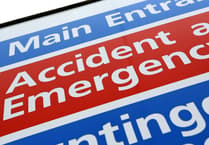The NHS in Bath and North East Somerset is currently seeing a sharp rise in people seeking help and support for common winter conditions that can often be managed at home through effective self-care.
Calls to NHS 111 and GP practices, as well as the region’s ambulance service, from people wanting help for simple flu-like symptoms have increased since the Christmas break, which has left some patients in need of genuine urgent care unable to get through.
With this current wave of flu cases expected to peak in the next few days, people across the region who find themselves under the weather are being urged to practise effective self-care.
Flu-like symptoms, such as headaches, fevers and sore throats, can be easily managed at home through a combination of resting, staying hydrated and making use of common medicine box items.
As antibiotics are ineffective against flu, people seeking healthcare advice should avoid calling their GP practice and instead make use of NHS 111 online, which is available at www.111.nhs.uk.
Connie Timmins, lead nurse for Infection Prevention and Control, Bath and North East Somerset, Swindon and Wiltshire Integrated Care Board, said: “Illnesses such as flu, along with coughs, colds and sore throats, are common at this time of year, and we’re currently seeing that play out across our region.
“While it’s important for people not to ignore their symptoms, the best remedies are often those that take place in the home, such as staying in bed, drinking lots of water and regularly taking paracetamol.
“When more people come forward and seek help for minor symptoms, it often prevents our frontline teams from getting to those patients most in need, and that is what we are seeing happen right now.
“With new year celebrations upon us, we’re also advising partygoers who begin to feel unwell, either with flu-like symptoms or those that could be Norovirus, to avoid going out and to welcome in 2025 at home.”
Pharmacies across the region are open as usual again following the Christmas bank holidays, and can provide help and support for most minor seasonal conditions.
Medication for a number of common illnesses, including sinusitis, urine infections and shingles, can now be prescribed by a pharmacist, meaning people with symptoms that could be one of these conditions no longer have to make an appointment with their GP practice.
People who find themselves in genuine need of emergency care, such as those with chest pains, significant bleeding or broken bones, should not put off visiting the closest hospital emergency department or calling an ambulance via 999.
An urgent GP appointment or help from NHS 111 should be asked for if a person is 65 or over, pregnant, has a long term medical condition or a weakened immune system. This is also the case if a person’s symptoms do not improve after seven days or is worried about a baby’s or child’s symptoms.
Further information on how to care for flu at home can be found on the national NHS website.



Comments
This article has no comments yet. Be the first to leave a comment.